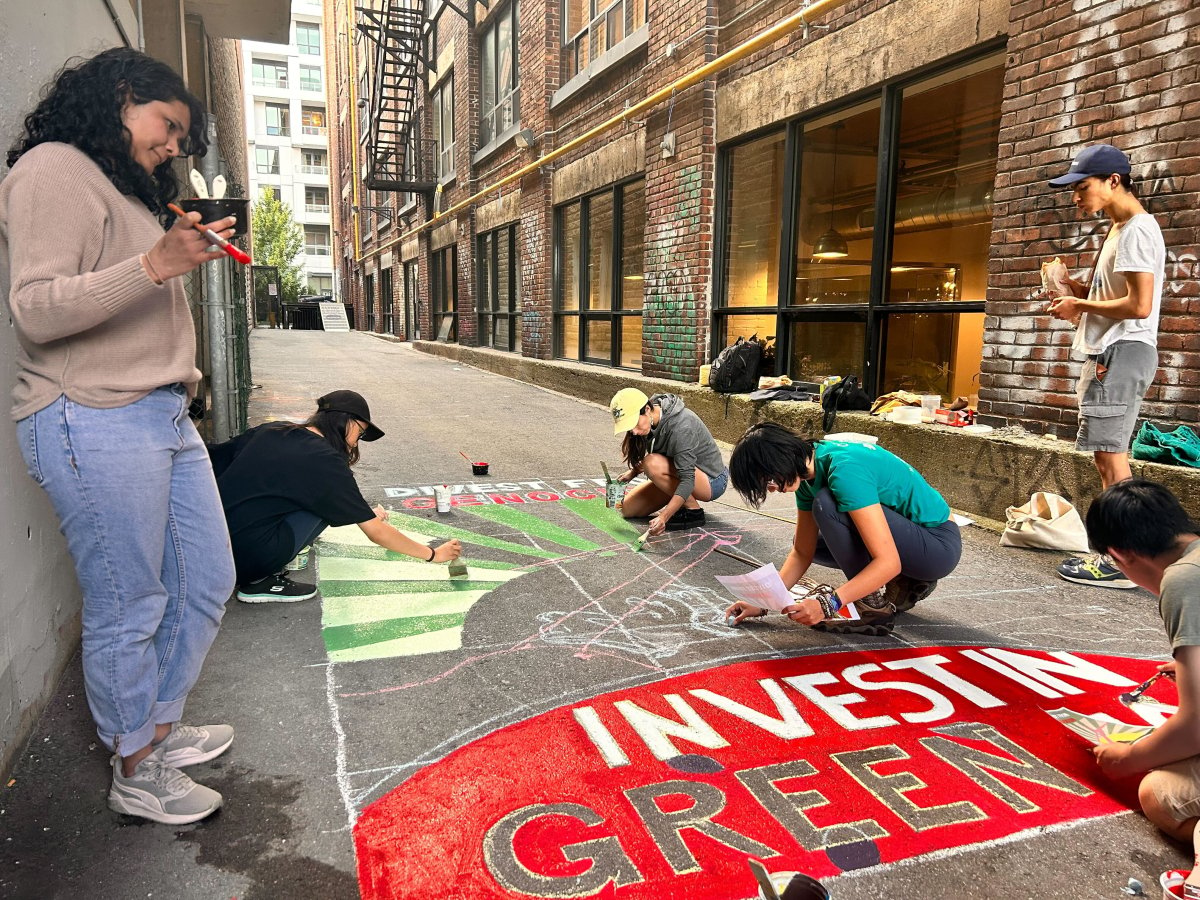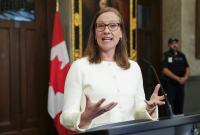Support strong Canadian climate journalism for 2025
In a small but lively corner of Spadina Avenue in downtown Toronto, young climate activists are transforming the space into powerful statements, their energy fueled by music and paint.
They are urging the government to establish a national Youth Climate Corps, a program to train young people in green careers over a two-year period to lead Canada toward a net-zero future. Fresh from their after-school routines, they gathered on Tuesday to create murals that envision a future where Canada invests in green jobs for youth.
“The design we're creating today is an image of what could happen if we truly invest in green jobs to solve the climate crisis,” said Minh-Ly Dereboul, a local activist. “The current climate crisis is urgent, and we need immediate solutions. The government should invest heavily in green jobs, decarbonization, and infrastructure.”
Led by the Climate Emergency Unit, a nationwide advocacy group, the creation of murals in cities across Canada is part of a national Day of Action aimed at pressuring the government to establish a Youth Climate Corps (YCC).
Their message is clear: the fight against climate change needs their energy, creativity, and commitment to a future with zero emissions and sustainable careers.
“When it comes to climate change, we need urgent action,” Dereboul said.
Climate change is not a distant threat — it's happening now, she noted. Toronto has already experienced the effects firsthand, from flooding to smoke-filled skies from wildfires, and increasingly frequent heat waves — issues that are becoming all too common globally. “We need young people to step up and take action,” she added.
However, progress has been slow. Instead of investing in renewable energy and sustainable infrastructure, the activists see continued support for fossil fuels, which Dereboul believes is a step in the wrong direction. “It feels like the government is neglecting young people and their future,” she said.

The Climate Emergency Unit suggests a youth corps would hire thousands of young people to work on climate solutions for their communities. The positions would be varied, and could include emergency response, building community resilience in the face of climate disruptions and developing climate infrastructure to reduce greenhouse gas emissions and boost renewable energy, home retrofits and public transit, the group said.
Last year, Laurel Collins, the NDP’s environment critic, tabled a motion also calling for creation of a youth climate corps. The initiative would offer training and employment for thousands of young adults aged 17 to 35 across Canada. According to Collins, the plan would enhance community and environmental resilience to climate change, build infrastructure to reduce greenhouse gas emissions, and establish a Crown corporation to lead these efforts.
Polling conducted by Abacus Data indicates that approximately 1.3 million young people across Canada would consider enrolling in a Youth Climate Corps if the government were to allocate funds for the program.
Last year, members of the Climate Emergency Unit delivered more than 600 mock Youth Climate Corps job applications to the Toronto office of Marci Ien, the federal minister for women, gender equality, and youth.
Inspiration for the proposed corps stems, in part, from an announcement a year ago by United States President Joe Biden about the creation of an American Climate Corps. The U.S. initiative received an overwhelming response, with over 40,000 applications for an initial 20,000 positions.
Canada's Environment and Climate Change ministry did not provide a response about Tuesday's event or whether it would support establishing a youth climate corps. In an email, the ministry emphasized that the Government of Canada's vision, as outlined in its youth policy, is to ensure that young people are empowered to create positive change in their communities and the world, while also living healthy, fulfilling lives.

The ministry pointed to several programs aimed at supporting youth employment and involvement in climate and environmental projects, including the Youth Employment and Skills Strategy (YESS), the Science Horizons Youth Internship Program, the Canada Service Corps (CSC), and the Climate Action and Awareness Fund. These federal initiatives, the ministry noted, are designed to help young people gain valuable work experience in a competitive job market while also contributing to climate action.
Dereboul is also deeply concerned about the ongoing debate surrounding the carbon tax, as some political parties back away from supporting the policy, and there is the possibility of its repeal if the Conservatives win the next election.
“It’s really disappointing,” she said. “Carbon tax is just one of the solutions, but it’s an important one. We need to organize and push back.”
Despite these challenges, the youth-led movement remains hopeful. “The key is to stay united, organize, and continue working as a community to push for positive change,” Dereboul said.






Comments